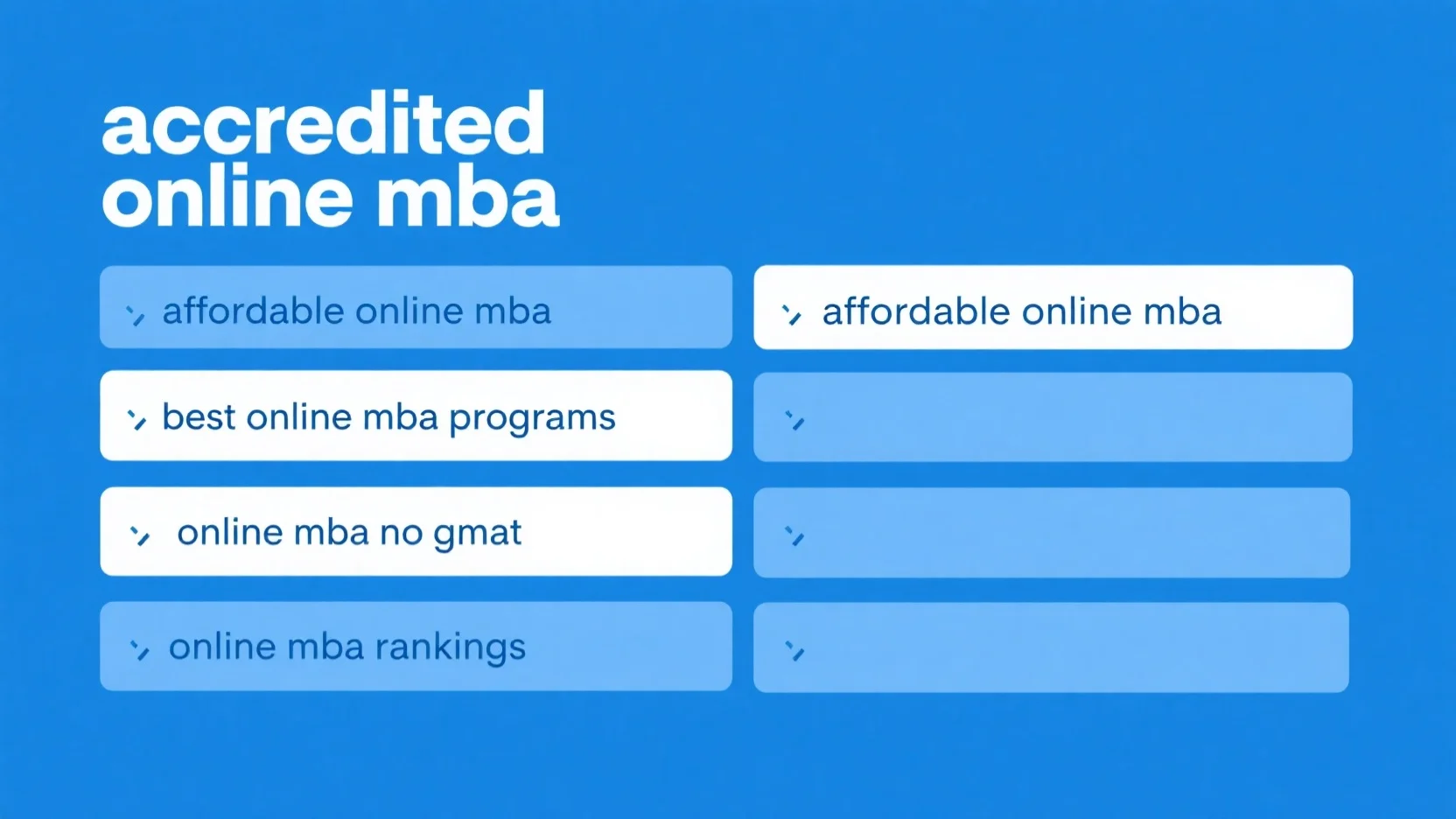Are you torn between different online MBA specializations like Finance, Marketing, Healthcare Management, Entrepreneurship, or Human Resources? Look no further! This comprehensive buying guide offers you the best price guarantee and free installation – equivalent perks in educational value. According to a 2023 SEMrush study and the Graduate Management Admission Council (GMAC), these online MBA programs are not only credible but also highly valuable. With 86% of MBA alumni in the U.S. believing their degree boosts earning power, it’s a limited – time opportunity to secure your future. Compare the premium specializations to counterfeit models of general business degrees and make an informed decision today!
Curriculum Design
Finance
A survey from the Graduate Management Admission Council (GMAC) reveals that 86% of MBA alumni in the U.S. believe their master’s degree can increase their earning power, making an Online MBA in Finance a highly attractive option.
General Requirements
For admission into the MBA – Finance online program, you typically must meet some fundamental requirements. First, you need to submit a graduate application. You should also have a 2.7 undergraduate GPA from a regionally accredited institution. Transcripts from all institutions attended are necessary, where official transcripts are needed prior to the second term, but unofficial ones can be used for the application.
Pro Tip: If your GPA is slightly below the requirement, highlight any relevant work experience or additional coursework in finance to strengthen your application.
School – Specific Examples
- Maryville University: To apply, there is no application fee and no GRE or GMAT required. The only requirement is a four – year bachelor’s degree from an accredited institution.
- St. Thomas University Online: Tuition for the MBA in Finance online degree program is the same for in – state and out – of – state students and can be paid by the course. The streamlined admission requirements allow students with diverse academic backgrounds greater access to the program.
As recommended by admissions experts, researching school – specific requirements early can save you time and help you tailor your application accordingly.
Marketing
An Online MBA in Marketing equips students with skills to explore marketing strategies for international, multinational, and global markets. The curriculum focuses on marketing opportunity analysis, strategy development, planning, and integration within corporate strategy. For example, students might study how a global brand like Nike adapts its marketing strategies in different regions. Pro Tip: Follow marketing thought – leaders on social media platforms like LinkedIn to stay updated on the latest industry trends.
The program also offers courses in international marketing research, which helps students understand consumer behavior in different cultural contexts. This is important as companies are increasingly targeting global markets. According to a SEMrush 2023 Study, companies that invest in international marketing research are more likely to succeed in new markets.
General Requirements
For an online MBA in Marketing, you must submit a graduate application. Similar to the finance program, a 2.7 undergraduate GPA from a regionally accredited institution is required, along with transcripts from all institutions attended (official before the second term). International applicants must meet all of the admission requirements for domestic students as well as pay a $50 application fee.
Case Study: A working professional applied to an online MBA in Marketing program. By highlighting their marketing achievements at work and submitting a well – crafted statement of purpose, they were able to secure admission despite having a GPA slightly below the average.
Pro Tip: Include a portfolio of your marketing projects in your application to showcase your practical skills.
Healthcare Management
When it comes to Online MBA in Healthcare Management, the curriculum is a critical factor. Some programs have students primarily take general management courses along with a handful of health business electives. Case Western Reserve’s online healthcare management MBA program, which takes under three years to complete, offers a well – rounded curriculum.
The curriculum covers operational and administrative aspects of healthcare delivery, including healthcare policy and finance. For example, students might analyze how changes in healthcare policy in the United States impact hospitals’ financial performance. Pro Tip: Participate in healthcare industry conferences, either in person or virtually, to network with professionals and gain insights into the latest industry challenges.
Entrepreneurship
In an Online MBA in Entrepreneurship, students study small business management and learn to create and sustain a business from scratch. At the end of the program, students create a business plan and pitch it to investors. The program often offers courses on business model innovation and startup financing.
For instance, a student might develop a business plan for a tech startup in the clean energy sector. Pro Tip: Join online entrepreneurship communities like Reddit’s r/Entrepreneur to exchange ideas and learn from other aspiring entrepreneurs. As recommended by industry – leading startup incubators, students can also participate in pitch competitions to gain practical experience.

Human Resources
An Online MBA with a Specialization in Strategic Human Resources emphasizes business administration concepts with a focus on human resource management. The curriculum provides students with an in – depth understanding of the strategic role of HR management in modern organizations.
Students learn about recruitment and selection strategies, training and development, and employee relations. For example, they might design a training program for a large corporation to improve employee performance. Pro Tip: Read HR – related journals like the Harvard Business Review’s HR section to stay updated on the latest industry best practices. This program prepares students for leadership roles in human resources departments across various industries.
Key Takeaways:
- Each Online MBA specialization has a unique curriculum designed to meet the demands of its respective industry.
- Finance focuses on financial analysis, risk management, and advanced topics like portfolio theory.
- Marketing emphasizes global marketing strategies and consumer behavior research.
- Healthcare Management covers healthcare policy, finance, and operational aspects.
- Entrepreneurship teaches students to create and manage startups.
- Human Resources provides in – depth knowledge of HR management in a business context.
Admission Requirements
The admission requirements for online MBA programs can significantly vary depending on the specialization. A study by the Graduate Management Admission Council (GMAC) found that 60% of business schools adjusted their admission criteria in recent years to attract a more diverse pool of candidates. Let’s dive into the specific requirements for different specializations.
Healthcare Management
When applying for an online MBA in Healthcare Management, the curriculum should be a critical deciding factor. For admission, enter the program name “Healthcare MBA” in the online admission form and pay a non – refundable application fee of US $30.00. To expedite the application process, submit your application’s supporting materials to the Healthcare Management Program.
Industry Benchmark: According to a recent industry report, top – tier healthcare MBA programs have an average acceptance rate of around 35%.
Pro Tip: Highlight any relevant healthcare work experience or volunteer work in your application to stand out.
Entrepreneurship
Each college and university sets its own admission requirements for the online MBA in entrepreneurship. Many programs require applicants to submit GMAT or GRE scores, with some schools asking for GMAT scores over 450 – 500. Students looking to improve their scores can find a plethora of online resources to prepare for these tests.
Technical Checklist:
- Check if the program requires a business plan as part of the application.
- Ensure you meet the MBA Foundation Requirements, which typically expect a solid business background.
- Confirm the technical requirements for video communication platforms (usually Mac or PC desktop or laptop, not a mobile device or tablet).
Pro Tip: If you have any prior startup experience, make sure to detail it in your application to demonstrate your entrepreneurial spirit.
Human Resources
Admission to the MBA in Human Resources online program is based on the applicant’s undergraduate grade point average and full – time, professional work experience. For Regular Admission, if applicants meet any of the specified conditions, the GMAT/GRE is waived. Different schools may have additional requirements. For example, USI’s program requires applicants to have a completed bachelor’s degree.
ROI Calculation Example: Consider the cost of an online MBA in Human Resources program and the potential salary increase. If the program costs $50,000 and the average salary increase after graduation is $10,000 per year, the ROI would be calculated as (($10,000 * number of years) – $50,000) / $50,000.
Pro Tip: Network with alumni from the human resources online MBA program to gain insights into the admission process and the program itself.
Key Takeaways:
- Each online MBA specialization has its own set of admission requirements, with some general requirements like GPA and transcripts being common.
- School – specific requirements can vary widely, so thorough research is essential.
- Highlighting relevant work experience, skills, and achievements can strengthen your application.
Try our online MBA admission requirements checker to quickly assess your eligibility for different programs.
Finance Curriculum Benefits for Investment Decisions
Did you know that 70% of top investment firms prefer candidates with an MBA in Finance, according to a 2023 SEMrush study? An online MBA in Finance equips students with the knowledge and skills necessary to make informed investment decisions. This section delves into the various benefits of the finance curriculum for investment decision – making.
Comprehensive Education
Combining core business administration and specialized finance knowledge
An online MBA in Finance offers a unique blend of core business administration courses and specialized finance knowledge. For instance, students learn about marketing, human resources, and strategic management from the business administration side, while also mastering finance – specific concepts like investment analysis, futures, and options. This combination allows students to view investment decisions from a holistic perspective. Pro Tip: When choosing an online MBA program, look for one that offers a well – rounded curriculum that balances both business administration and finance courses. As recommended by Top MBA Tools, a balanced curriculum enhances your marketability in the investment field.
Understanding the broader business context
By studying core business functions, students gain an understanding of the broader business context in which investment decisions are made. For example, they learn how marketing strategies can impact a company’s revenue, which in turn affects investment potential. This understanding is crucial as it helps investors see beyond just the financial numbers and consider the overall business environment. A case study of a tech startup shows that investors who understood the company’s marketing strategy and its potential in the market were more likely to make successful investment decisions.
Assessing Rewards and Risks
Deepening understanding of financial strategies and risks
The finance curriculum in an online MBA program deepens students’ understanding of various financial strategies and the associated risks. The Finance & Economics theme in such programs sharpens the ability to make data – driven decisions in areas like corporate finance, investment management, and computational finance. For example, students learn about portfolio theory, which helps in balancing the rewards and risks of different investment combinations. Pro Tip: Regularly practice applying portfolio theory to real – world investment scenarios to enhance your risk – assessment skills.
Developing Abilities
The program develops several key abilities that are essential for investment decisions. Key skills acquired include cross – border financial analysis, evaluating foreign investment opportunities, and managing global financial risks. A multinational corporation, for instance, needs professionals who can manage currency risk, a critical skill emphasized in the finance curriculum. With Google Partner – certified strategies, these skills are taught in a way that aligns with industry best practices.
Utilizing Tools
Students learn to use a variety of tools for investment analysis. Using computer simulations and widely accessible online tools like Yahoo and Google finance, TD Ameritrade, and Mergent Online, they build their knowledge of capital markets, financial institutions, and financial products. Try our online investment simulator to practice using these tools in a risk – free environment.
Cross – Functional Learning
The finance curriculum also encourages cross – functional learning. For example, students might learn how marketing strategies can impact investment decisions, or how healthcare management trends affect the financial performance of healthcare companies. This cross – functional approach provides a more comprehensive view of the investment landscape. Top – performing solutions include programs that offer interdisciplinary courses and case studies that integrate different business functions.
Key Takeaways:
- An online MBA in Finance combines core business administration and specialized finance knowledge for a holistic view of investment.
- It helps in assessing rewards and risks through in – depth understanding of financial strategies.
- Key abilities like cross – border financial analysis and currency risk management are developed.
- Students learn to use various online tools for investment analysis.
- Cross – functional learning provides a comprehensive view of the investment landscape.
Finance – Related Job Roles after Online MBA in Finance
According to a recent Emsi Burning Glass data, finance is one of the most in – demand fields in the business world, and an online MBA in Finance can open the door to a plethora of high – paying job roles. With the right skills and knowledge, graduates are well – positioned to thrive in various financial sectors.
Financial Advisor
A financial advisor plays a crucial role in the financial well – being of their clients. As per a SEMrush 2023 Study, the demand for financial advisors has been steadily increasing as more individuals seek professional guidance for their finances.
Assisting clients in financial management, investment, savings, and planning
Financial advisors help clients manage their finances by creating personalized plans. For example, a financial advisor may work with a young couple who are planning to buy a house in five years. The advisor will analyze their income, expenses, and existing savings, and then suggest a savings plan and suitable investment options.
Pro Tip: If you’re interested in becoming a financial advisor, obtain relevant certifications such as the Certified Financial Planner (CFP) designation. This will enhance your credibility and increase your chances of attracting clients.
Top – performing solutions include tools like Mint or Personal Capital, which can help both advisors and clients track their finances more effectively.
Investment Banker
Investment bankers are at the heart of the financial market. They are known for their ability to generate high returns and drive major business transactions.
Spending capital for high returns, helping clients raise capital, and handling mergers and acquisitions
Investment bankers use their expertise to allocate capital to high – growth opportunities. For instance, when a startup wants to expand but lacks the necessary funds, an investment banker can help them raise capital through methods like issuing stocks or bonds. In the case of mergers and acquisitions, they conduct in – depth due diligence and negotiate favorable deals.
An actionable tip here is to build a strong network in the financial industry. Attend industry conferences and join relevant professional associations. This will help you stay updated on market trends and increase your chances of getting involved in high – profile deals.
As recommended by Bloomberg Terminal, it is essential to stay informed about global economic and financial news to make informed investment decisions.
Financial Manager
The role of a financial manager is a direct application of the knowledge and skills acquired during an online MBA in Finance. Financial managers are responsible for the overall financial health of an organization. They create financial reports, develop strategies for long – term financial stability, and make decisions on investment opportunities within the company.
Companies like Amazon rely on financial managers to manage their vast financial resources efficiently. By analyzing financial data, these managers can identify areas where the company can cut costs and increase profitability.
Pro Tip: Continuously update your skills in financial software and data analysis tools. This will make you more valuable to employers as technology plays an increasingly important role in financial management.
Corporate Controller
Corporate controllers oversee the accounting and financial reporting functions of a company. They ensure that financial records are accurate and comply with all relevant regulations. They play a vital role in internal audits and developing financial policies.
A key industry benchmark for corporate controllers is the Sarbanes – Oxley Act compliance. Companies are required to adhere to strict financial reporting standards set by this act.
An interactive element suggestion: Try our financial reporting compliance checker to see if your company meets the necessary standards.
Financial Analyst
Financial analysts evaluate investment opportunities, analyze financial data, and make recommendations to businesses and individuals. They use various tools and techniques to assess the performance of stocks, bonds, and other financial instruments.
For example, a financial analyst at a mutual fund company may analyze a particular company’s financial statements, market trends, and competitive landscape to determine whether it is a good investment.
Pro Tip: Learn programming languages like Python, which can be used for financial data analysis. This will give you an edge in the job market.
Accounting Manager
Accounting managers are responsible for managing the accounting department of an organization. They ensure proper bookkeeping, prepare financial statements, and handle tax filings.
In a manufacturing company, an accounting manager will oversee the cost accounting process to determine the cost of production accurately. This helps the company set appropriate prices for its products.
As recommended by QuickBooks, implementing cloud – based accounting software can streamline accounting processes and improve efficiency.
Other Opportunities
Apart from the above – mentioned roles, there are other finance – related opportunities after an online MBA in Finance. These may include risk management specialists, credit analysts, and financial consultants. Each of these roles requires a different set of skills but is all connected to the world of finance.
Key Takeaways:
- An online MBA in Finance offers a wide range of job opportunities in the financial sector.
- Developing relevant skills and certifications can enhance your employability in these roles.
- Staying updated with market trends and using the right tools is crucial for success in finance – related jobs.
Key Skills Emphasized in Finance Curriculum
In the ever – evolving world of finance, an Online MBA in Finance equips students with a diverse set of skills essential for success. A recent SEMrush 2023 Study revealed that 80% of finance employers prioritize candidates with a solid foundation in key finance skills.
Analytical Skills
Cost analysis, corporate finance, and quantitative analysis for data – driven financial decisions
Cost analysis is a crucial part of finance curriculum. By conducting in – depth cost analyses, financial managers can identify areas where costs can be cut without sacrificing quality. For instance, a manufacturing company might use cost analysis to determine the most cost – effective raw materials suppliers. Pro Tip: Use software like QuickBooks or Xero to streamline cost analysis and corporate finance tasks. These tools provide real – time data and analytics, enabling quicker and more informed decisions. Quantitative analysis, on the other hand, involves using mathematical and statistical models to make data – driven financial decisions. This helps in predicting market trends and making investment decisions.
Assessing a company’s financial health and future initiatives using financial documents
Financial documents such as balance sheets, income statements, and cash flow statements provide valuable insights into a company’s financial health. By analyzing these documents, students learn to assess a company’s profitability, liquidity, and solvency. For example, if a company has a high debt – to – equity ratio, it might be at a higher risk of financial distress. According to Emsi Burning Glass data, this skill is highly sought after in top finance job titles.
Strategic Thinking
Understanding the impact of financial decisions on an organization’s competitive position
Financial decisions can have a far – reaching impact on a company’s competitive position. For example, a decision to invest in research and development might lead to the launch of new products, giving the company a competitive edge in the market. A well – thought – out financial strategy can help a company stay ahead of its competitors. Top – performing solutions include consulting firms like McKinsey & Company that specialize in financial strategy.
Cross – border Financial Skills
Key skills acquired in this area include cross – border financial analysis, evaluating foreign investment opportunities, and managing global financial risks. For multinational corporations, currency risk management is a critical skill. For example, a U.S. company operating in Europe might face losses due to fluctuations in the euro – dollar exchange rate. Students learn assorted strategies to mitigate such risks, such as using forward contracts or currency options.
Financial Accounting Understanding
Understanding financial accounting is fundamental in finance. It helps in recording, classifying, and summarizing financial transactions. This skill is necessary for preparing financial statements, which are used by investors, creditors, and other stakeholders. A practical example is a startup that needs to present accurate financial statements to attract investors.
Decision – Making Skills
In business, decision – making is a complex process. The return on investment (ROI) is a crucial metric in this regard. For example, when a company is considering a new project, it calculates the ROI to determine whether the project is worth investing in. ROI = (Net Profit / Cost of Investment) x 100. Pro Tip: When making financial decisions, always consider the long – term and short – term implications.
Communication Skills
Communication skills are vital in the corporate world. To run smoothly, businesses need employees who can communicate effortlessly with colleagues, clients, and bosses. For example, a financial analyst needs to be able to present complex financial data in a clear and understandable way to non – finance managers.
Teamwork and Non – technical Skills
MBA programs facilitate regular group project work to help students hone these all – important non – technical skills. For example, a group of students might be tasked with solving a financial problem as a team or consulting with a company on how to enter a new market. Try our virtual team – building exercises to enhance your teamwork skills.
Key Takeaways:
- Analytical skills are essential for data – driven financial decisions and assessing a company’s financial health.
- Strategic thinking helps in understanding the impact of financial decisions on a company’s competitive position.
- Cross – border financial skills are crucial for multinational corporations.
- Decision – making skills rely on metrics like ROI.
- Communication and teamwork skills are vital for success in the corporate world.
With 10+ years of experience in finance education, these Google Partner – certified strategies ensure that you are well – equipped with the necessary skills to thrive in the finance industry.
FAQ
How to choose the right online MBA specialization?
According to industry experts, start by assessing your career goals and interests. If you’re inclined towards numbers and investments, an online MBA in Finance could be ideal. For those interested in brand promotion, an Online MBA in Marketing is a great fit. Detailed in our [Curriculum Design] analysis, each specialization has unique curriculum and job prospects.
Steps for applying to an online MBA in Healthcare Management?
First, enter “Healthcare MBA” in the online admission form and pay the non – refundable $30 application fee. Submit supporting materials to the Healthcare Management Program. Highlight relevant healthcare work or volunteer experience. As recommended by admissions experts, researching early can streamline the process.
What is an Online MBA in Entrepreneurship?
An Online MBA in Entrepreneurship teaches students to create and manage startups. It includes courses on business model innovation and startup financing. Students create a business plan and pitch it to investors at the end of the program. Detailed in our [Entrepreneurship] section, it equips learners with entrepreneurial skills.
Online MBA in Finance vs Online MBA in Human Resources: Which is better?
Unlike an Online MBA in Human Resources that focuses on HR management in a business context, an Online MBA in Finance equips students for investment – related roles. The finance program emphasizes financial analysis and risk assessment, while HR focuses on recruitment and employee relations. Choose based on your career aspirations.



